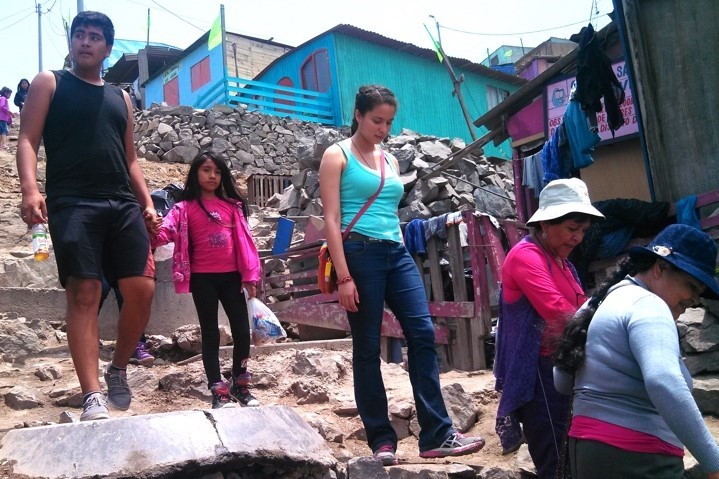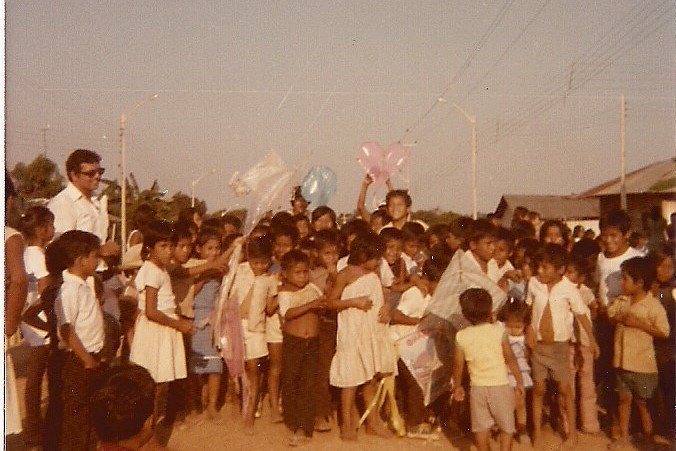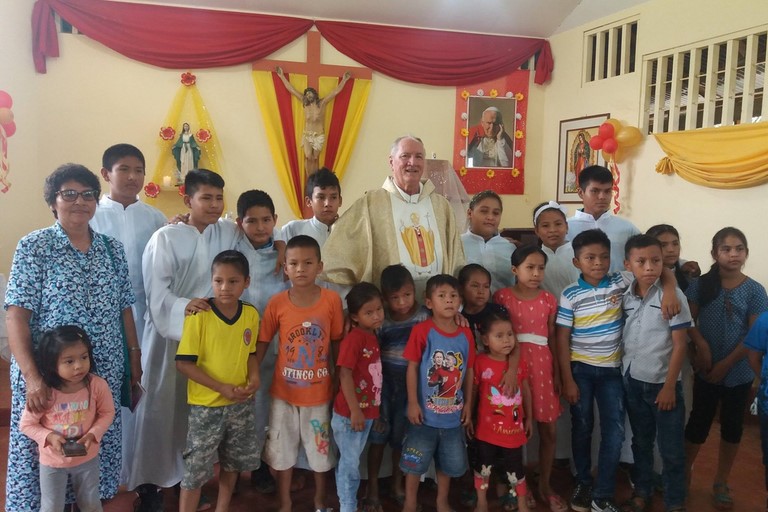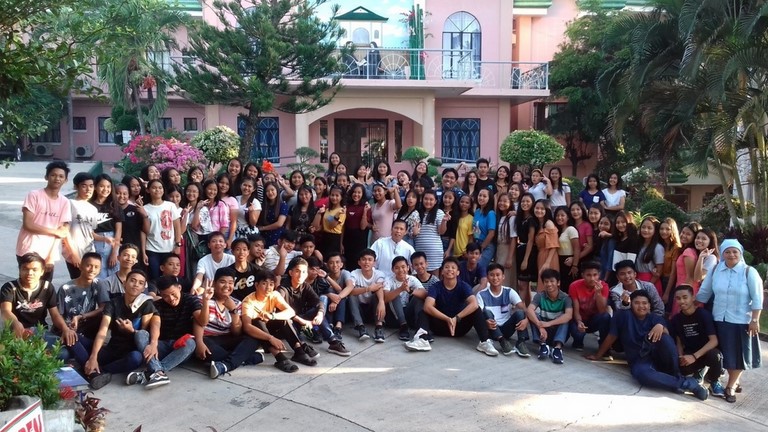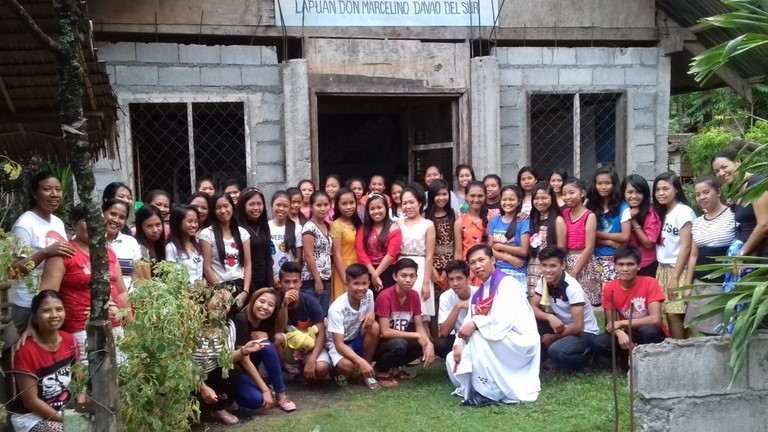Easter Reflections 2020
Seventh Sunday of Easter
Go.. for I am with you always.
The Gospel of this day is the end of the Gospel of Matthew and it wants to make visible what the Gospel of Luke has already presented us with the presentation of the Ascension of Jesus, the moment where the disciples, the followers of Jesus go, leave and announce the gospel where Jesus could not go, in the whole nation. The gospel is the mandate that the Lord entrusts to the whole Church, a mandate that is born from the force of love, from the fact that Jesus has come before all of us, who has given his life to save us and show us the love and mercy of God.
But how to proclaim the gospel and be the witness of the love and mercy of God in these difficult times? Where does Jesus send us? He sends us not only to those who are near or to the most welcoming people to us but to everyone, in any milieu, existential peripheries, to those who seem more distant and also to the most indifferent who needs the light of the gospel.
Because Jesus looks for us and loves us equally. He calls us to care, to not to be indifferent and to love the neediest people, to make them our neighbor with the disposition to approach them. To take the initiative to approach and include others, to be aware of the pain and suffering that our fellow brothers and sisters are experiencing today, the poorest and most vulnerable, giving them hope. The hope that sustains us, that keeps us to persevere and continue converting, bearing fruit, rediscovering, and remaking the steps of Jesus in time of trials and discouragement.
This calls us in these difficult times of COVID 19, with the social confinement that is prolonging more and more, we have to stop seeing only ourselves and we have to begin to see the other. We have to be the disciples living an authentic human life that comes from God who, with its substance, shows that humanity recreates itself from below, from the last, and He does it without being indifferent to others, but as a result of that deep experience of the love of Jesus crucified.
We have to leave behind the safe and known parameters, the codes of interpretation of the shared things of daily life, and the desire first to identify ourselves with others because, in that experience, the communion with God comes into being. We could lead to a fairer, equal, pleasant, and fruitful future for all.
We need to look with faithful eyes like a love story of the Father, the presence of Jesus, returned and risen, hopeful, and on its way. But we cannot fail to highlight the promise to make disciples of all the nation, that corresponds to the promise of Jesus to be always with all of us. To be disciples of Jesus is to be led by his Spirit to and for a new life, based on the unconditional and unconventional love and creativity of following the lifestyle of Jesus that is good, healthy, and liberating for all humanity.
Sixth Sunday of Easter

The Holy Spirit is manifested in the unity of the Church and the mission.
John 14,15-21
Brothers and sisters, our Gospel of today speaks about the farewell speech and its central point is the disciple’s love for Jesus, expressed through the observance of his commandments. Jesus also speaks of the Spirit that the disciples will receive. The Lord announces that he is going to go, but he is not going to leave us as orphans.
He is a Defender and advocate for our cause, another advocate shall come, the Spirit of truth. In this the unity of the mission of the Son and the Spirit is manifested to the one who receives and keeps the commandments as a sign of their love for him.
This was a source of consolation and encouragement for the disciples and, today, for us because we know that Jesus has never left us aimless, like the people of Israel in the desert, caarying the ark of the covenant with the commandments before them, representing the Presence of God in their midst, in the Church and in each one of us for the greater glory of his Kingdom.
Today, Jesus is inviting us to wait and observe the Lord’s commandments and count on the certainty of his presence in us and between us, not only physical, but spiritual with interior faith. Our fellowship in the mystery of the Holy Trinity began with the faith that we received in baptism and then confirmed in the community. The Holy Spirit is manifested in the unity of the Church and the mission. Those who love Jesus are loved by the Father, and Jesus manifests himself to them in the Holy Spirit.
It is a tremendous presence that fills us with courage to face obstacles and difficulties in our lives especially at this time of pandemic of Covid-19. Numbers of our brothers and sisters in the families and in the world are sick, dying and suffering from hunger, instead of enjoying their normal activities, work, studies and routines in life. But in order to enjoy these graces and challenges we must first observe the commandments of the Lord and accept that the Holy Spirit is always in our side as our Defender and Protector from all evils and never abandons us. We have heard that many people are complaining, frustrated and going through a depression because of what is happening in this time of confinement and that they don’t feel Jesus at work in their daily life, to the point that they even claim that God has much more important thing to do than worry about their situations and problems. They think that God is away from them. Is it really so or is it that they are the ones who are far from God?
Whenever we do not observe Jesus commandments, we take him out of our lives. It is not He who abandons us. Whenever our behavior goes against the will of God, causes damage to our brothers and ourselves, then we must offer our sympathies and support to our communities, our government leaders, the needy and the medical health frontliners who are always deeply in our prayers, for the grace and protection of God. So, if we want to feel the presence of Jesus and the comfort of his Spirit, we must first live as He wants us to live. Let us welcome Christ in our hearts, love our brothers and sisters, stay at home, observe social distancing, wear our face masks and follow some health recommendations to prevent the Corona Virus. Live like Jesus is to accept that we will have challenges and tribulations to live out, much more with Him than without Him. To walk in the footsteps of Christ is not easy, the road has lot of thorns and the yoke is heavy to carry on. Furthermore, we are not perfect and we often shed tears and fall.
But our God does not condemn us, he helps and provides us what we need by sending us his Spirit, to prove to us that it is in our weakness that he reveals his transforming strength. May the light, hope and happiness of our Ressurected Jesus and his Spirit of Truth will begin to shine in each one of us so that more brothers and sisters will discover him and surrender to him in the mission according to His will.
Praise be to our Lord Jesus Christ!
Fifth Sunday of Easter
"Do not be troubled."
Acts 6:1-7, 1Peter 2:4-9, Jn. 14:1-12
My brothers and Sister in Christ, Happy Easter to all!
Today we celebrate the 5th Sunday of Easter.
In the first reading from the Acts of the Apostles, we heard as the Christian community continued to grow, it was inevitable that some problems of organization and administration would arise.
And so, the Apostles, recognizing the need that the body of Christ was not just a spiritual communion,
but a community of men and women who had everyday needs, appointed seven "servants" or "deacons" to see and assist in the smooth running of the community. And the Gospel reading of this Sunday begins with an amazing exhortation from Jesus; "Do not be troubled." By appointing the seven men, the early Church was in fact taking into serious account these words from Jesus.
The Church isn't just a spiritual communion of believers desiring to get to heaven. It is also a community of men and women who seek to live out the Good News amidst the ordinary circumstances of everyday life. Wanting to get to heaven should never mean that we abandon the concerns and needs of this earth. Jesus did not die for a vague and amorphous idea; no, he gave up his life for concrete men and women who had worries, problems, needs, challenges, anxieties, difficulties, fears, hopes and dreams. We must never think that the spiritual life is an escape from the cares of this world. Jesus never taught that, but rather what he reminded his disciples, again and again; is that for those who put their trust in him and the father, no worry or care in this life can ever separate them from him and the one who sent him.
Brothers and Sisters, the Lord reminds us that the spiritual life and prayer are not meant to give us an escape from life, but are meant to immerse us in life even more and with the full knowledge and confidence that we do so with him by our side, leading, guiding and caring for ourselves.
We might ask ourselves that; has there been something in relationship, works, family, etc. that we may have been neglecting or we have taken for granted? we are call to set aside sometime to attend to them; our faithfulness to the Lord demands nothing less. We pray that the risen Lord will always helps us to be a living word to others.
Fourth Sunday of Easter
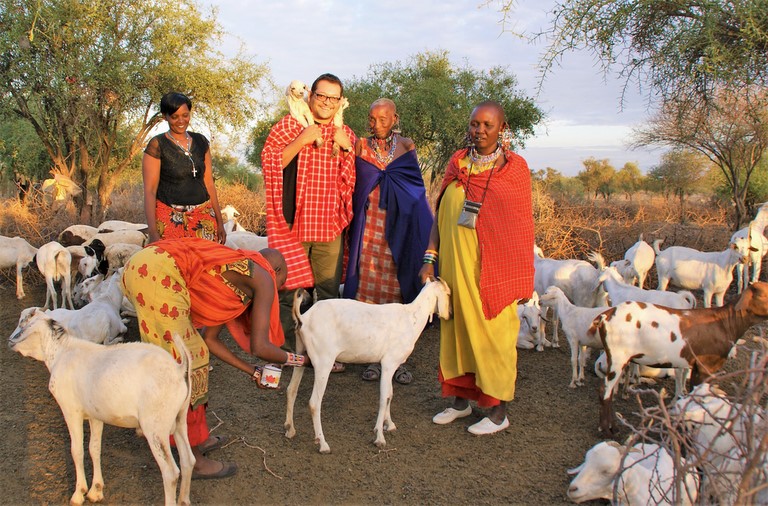
Jesus is the good shepherd
John 10, 1-10
We are celebrating the Easter season, a time when we are invited to irradiate the light of the Risen One. For being apostles of the resurrection, we need to experience the presence of the “Lord of the Life” in our inner self, recognize him and let him guide us.
Precisely today's Gospel tells us about a deep relationship of intimacy between the shepherd and his sheep. The shepherd knows each one by name and the sheep recognize his voice and follow him.
Jesus is the shepherd, the one who guides us, the one who goes before his sheep.
But, it is not always easy to recognize the voice of the pastor among so many other internal and external voices that surround us. It is important that we dedicate time to be with the Lord, to contemplate his life, his message, his presence in our midst. The time of prayer, as a space of silence, meditation, trust and disposition, becomes a privileged space of encounter and intimacy with the Lord.
It is important to reflect on this intimacy, intimacy happens between people who have found each other, who know each other, who love each other, who trust each other, as the sheep trust their shepherd. The encounter with the Lord occurs in the depth of our hearts, where God becomes a loving presence. Intimacy with Jesus leads us to life in abundance, to an interior life overflowing with joy and hope, which becomes a source of life for those around us and a living testimony that we follow Him who has risen from death.
Third Sunday of Easter

Two disciples return home
Who are these two disciples who move away from Jerusalem and return to their small village of Emmaus? Who is Cleopas and the other disciple?
Jesus is dead. They have lost hope and are experiencing a deep crisis of faith. Was what they lived with Jesus just an illusion? They are sad and talk about their lost dream.
They are somehow blind. They do not recognize the pilgrim who walks with them. They do not realize that what they have lost was nothing more than a false hope in a powerful Messiah. They believed that He should establish a Kingdom similar to those they knew. Although they knew the scriptures very well, they did not help them to interpret the dramatic events they had just experienced in Jerusalem.
In the midst of the human crisis they were experiencing, this unknown pilgrim illuminates their intelligence to the meaning of the events, rereading them in the light of the Scriptures. Revive their aching heart, awaken their faith and revive their hope. Their hearts burned again. However, they could not recognize the pilgrim who had accompanied them on the road and who was acting as the guest.
Only when they get home, when they break the bread, their eyes open, they recognize that they are in the presence of Jesus and that his project for a new world full of solidarity, has not died.
Cleopas and the Other disciple today
It is impossible to trace the history that we live on that of the past. However, what we live in the midst of so many humanitarian crises, can help us identify with these two disciples who walked sad and without spirit, who had lost hope, who did not see the human sense and did not recognize the living Jesus who accompanied them.
No one can be indifferent to the current humanitarian crises. The Coronavirus pandemic and Covid-19 disease, the corruption and hunger make us blind. Where are we going? What will happen after the return to “normality”? What do we understand by normality?
Something has to change in our selfish way of living, at the personal level and also socially and collectively. It is no longer enough to talk about solidarity, we must live it. We must create a world where solidarity and social sensitivity colored all aspects of human life and personal, social and also economic and political relationships. Then we will recognize Jesus by sharing the bread.
Second Sunday of Easter
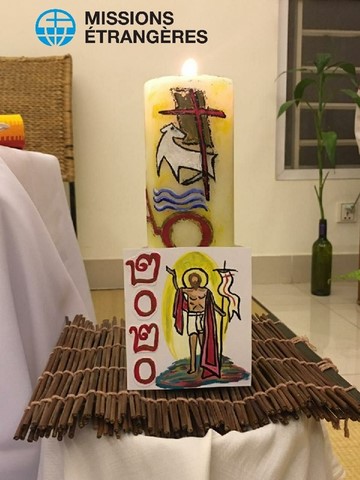
Thomas, where are you? (Jn 20:19-30)
Thomas, the apostle, was not with the rest of the disciples that evening. The Gospel of John does not tell us where he was. It is easy to presume that, like the rest, he was full of fear. It is not easy to process grief. All of Jesus' friends were faced with failure. Thomas was no exception. His dreams, his projects, his ideas were shattered, that Good Friday afternoon.
Thomas pronounces few words in the whole gospel. They call him the "twin". And we don't know anything about his twin brother either. Do we? Shortly before Lazarus' resurrection, Jesus decides to go up to Judea, despite the warning of the rest of the group. Thomas tells them all: "Let us also go and die with him" (John 11:16). Nevertheless, we know that Thomas "vanished" after Jesus' arrest.
During the last supper, after the washing of the feet, Jesus gives a long speech to his group. Jesus tells them that he will soon return to the Father, that they will not be able to follow him "for now". Thomas intervenes asking: How can we know the way - to be able to follow you - if we do not know where you are going? (Jn 14:5). But Thomas, like the rest, does not understand that Jesus himself is the way. Then, Thomas, "goes".
In these times of pandemic, we face new realities and challenges, which are very difficult to clarify yet. We are living through constant grief, cycles whose closures are still far from complete. Many of us are "vanishing".
Perhaps we cry, for the work we lost, for the hugs we didn't give, for the loved ones that have gone. Perhaps, like Thomas, we face the harshness of unfulfilled dreams, projects that can never be completed. Maybe like Thomas, we have lost the enthusiasm and initial strength to go up to Jerusalem to complete OUR destiny.
Where was Thomas?
Confinement, quarantine, social isolation. Buzzwords. Measures that invite you to prevent a contagion. Jesus' group lived for days in confinement. Refusing the death of their friend, locked up in fear, scattered with sadness, fleeing defeat. Thomas was... absent.
Confinement may be a possibility. Something new can be born there. “When the doors were locked, where the disciples were, for fear of the Jews, Jesus came and stood in their midst
and said to them, “Peace be with you”. He lives! For Love has brought him back to life. In that confinement, remembering the beloved master, lit the spark that overshadowed the darkness. Without that new faith, without that new sight, it was impossible to see the Risen One. The group, gathered around the table of word and bread, recognized the Risen Lord. Thomas was not with them. He who does not sit at the table of word and bread cannot see the Risen One.
“Now a week later his disciples were again inside and Thomas was with them”. Eight days later, in community. Thomas, who was still thinking of his dreams, of his failed projects, touched with his fingers the wounds of the one who was crucified. Touching those signs of the nails and the spears, is to touch the wounds of all the crucified of the world, is to understand that our dreams and projects must be configured to the dreams of the God the Father of Jesus.
In and with Jesus, Thomas is now present. He is for and with the community of believers. Thomas, gathered together with his sisters and brothers, is now a man of faith. He moved from an absent confinement to an active presence, even though fear and threat were still outside.
Thomas had a twin brother... do you know him now?

